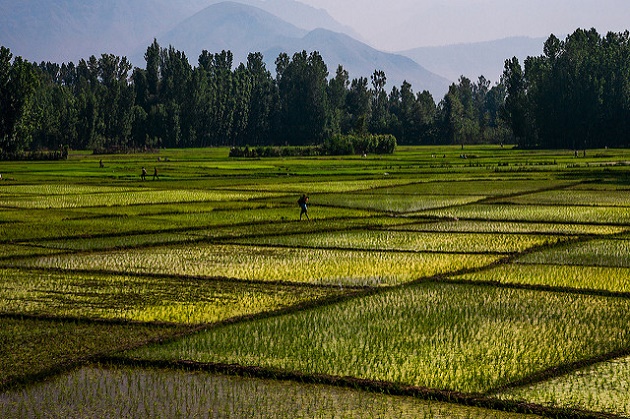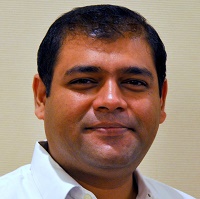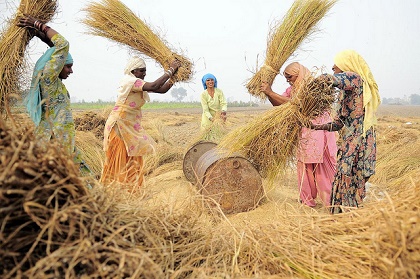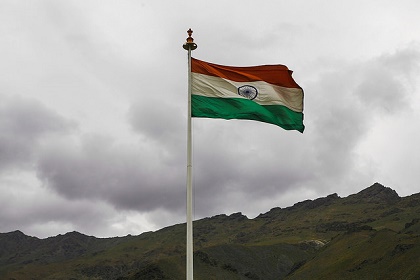“Violence against women is increasingly being used as a tool of persecution in India”
An in-depth interview with Vijayesh Lal of the Evangelical Fellowship India. Chhattisgarh, Karnataka, Orissa, Madhya Pradesh are the states were Christians face the strongest persecution.
21 FEBRUARY 2017 · 13:43 CET

“The Church in India is growing despite persecution. The growth is numeric as well as in maturity.” But new forms of violence against Christians are the sad reality in the country, Vijayesh Lal told Evangelical Focus in an in-depth interview.
Under the so-called ‘Freedom of Religion’ act, “it was normal for pastors and evangelists to be arrested and detained and then charged; but now even children and women are regularly being arrested and charged as well.”
It is very disappointing to see that no political party in India has real religious freedom as one of their main priorities, explains the General Secretary of the Evangelical Fellowship of India (EFI).
Right now, the ‘Hindutva’ ideology is one of the main causes of the marginalization of Christians. This nationalist movement binds national identity to Hinduism using “fascist principles”. The movement has grown and key political leaders are now “avowed followers and preachers of this exclusionist ideology”. For them, “the Christian community is an easy target for they generally do not retaliate, hence the violence.”
In January 2017, “there have been 18 verified incidents against Christians in India”, says Lal. He knows this figure because the Religious Liberty Comission of the EFI issues careful researched reports every month.
Another effort to stop the discrimination has been the creation of the United Christian Forum (UCF), “a collection of activists and like-minded groups which operate a 24/7 free helpline.”
Vijayesh Lal responded to questions of Evangelical Focus.

Answer. Though the Indian Church has always seen persecution, the late 1990s really brought it out into the public domain with the burning of the many Churches in Dangs, Gujarat in 1998 and the killing of Graham Stewart Staines and his two sons in Mayurbhanj, Orissa in 1999.
Since then the cases of incidents against the Christian community have been growing steadily, reaching their peak during 2008 with Christians being targeted systematically in Kandhamal, Orissa and Karnataka respectively.
Today some of the states where Christians continue to experience the most violent opposition are: Chhattisgarh, Karnataka, Orissa, Madhya Pradesh, Rajasthan, Maharashtra and Uttar Pradesh. Persecution is an all-Indian phenomenon barring only the states of Nagaland, Mizoram and Meghalaya. In all other states Christians experience varying degree of hate campaigns, negative propaganda, and violence.
A review of the incidents recorded by the Evangelical Fellowship of India’s Religious Liberty Commission [EFIRLC] from New Year Day 2016 to 30th June 2016, and confirmed in independent fact-finding surveys by important civil society groups, source this violence, coercion and statements intimidating Christians to village and town units of the Bajrang Dal, Vishwa Hindu Parishad, Akhil Bharatiya Vanvasi Kalyan Ashram and several newly formed groups affiliated to the Rashtriya Swayamsewak Sangh. The political wing of the RSS, the Bharatiya Janata party, is now in power in the Union government in New Delhi and in most major states.
According to the data available, and it needs be made clear that this is carefully corroborated and authentic data and may be just a fraction of the violence on the ground, there were 134 separate incidents of violence in the first six months of 2016 across in 21 of the 29 States and seven Union Territories of the country. This should be compared to total 177 incidents recorded by EFI in the year 2015.
Christian persecution in India is mainly social, i.e. social restriction on religious freedom, rather than active government led persecution or restrictions. The central government and the state governments especially the BJP led state governments usually turns a blind eye to the persecution of Christians or in worst-case scenario, corroborate with non-state actors unleashing hate crimes on Christians. The persecution is largely physical and instances of violence against pastors, Christian leaders, lay people, even women and children is an everyday affair. Gender crimes i.e. violence against women as a tool of persecution is increasingly becoming a sad reality.
The disruption of Church services and vandalism of churches and private properties of Christians is very common. Christians, especially pastors, are detained and arrested quite frequently especially in north and central states of India, mostly on frivolous charges or under the anti-conversion laws better known as freedom of religion acts. Every year several Christians also lose their lives because of violence caused by hate crimes.
While the states of Chhattisgarh and Madhya Pradesh have a history of anti Christian policies and violent non-state agencies targeting the Christian community, there has been a startling rise in such targeted violence in Uttar Pradesh, which is currently facing elections, and in the southern State of Tamil Nadu, governed by Mr. Modi’s ally, the All India Anna Dravida Munnetra Kazhagam.
Then there is structural persecution, which is growing with every passing year, and it involves the misuse of law or the drafting of legislation to contain the Church and its activities. It needs be recalled that the undivided Madhya Pradesh, of which Chhattisgarh was then part, was among the first ones to enact laws proscribing and criminalizing evangelization and conversions. Tamil Nadu enacted a similar law, but later withdrew it in the face of a strong protest from the Christian community, which had a political sway in some districts.

The ironically titled “Freedom of religion” acts remain a major source of harassment for Christian workers in the country. Though they are primarily operational in the states encompassing the tribal belt of central India, the presumption in police and lay circles is that it is an all India legislation. The repeated statements of the ruling political parties strengthen this presumptive situation. Though the law is also on the statute books of Arunachal Pradesh and Himachal Pradesh in the Himalayan belt, its main operation is in the central Indian states of Madhya Pradesh, Chhattisgarh, Orissa, and Gujarat. It was normal for Pastors and Evangelists to be arrested and detained and then charged under this act, but now even children and women are regularly being arrested and charged as well. About a year and a half ago in Khandwa, Madhya Pradesh, an eight-month-old child was forced to stay in prison along with her mother for almost 5 days after the mother was charged under the provisions of the “Freedom of Religion act”. There are instances of other children being booked and charged under the act as well. Civil society groups have conducted deep surveys of the ground situation in these regions, and have come to the conclusion that apart from religious persecution, the laws are being used for dispossessing the people of their land and other rights, and marginalizing them further in the social narrative.
Sections 295 (A) and 153 (A) of the Indian penal code also remain favorite instruments of the police and the right wing activists. Both sections pertain to hurting religious sentiments and are non-bailable offenses.
It is very common for Hindutva activists to first file a complaint against Christians, then beat them up (mostly with the police and local media watching) and then hand them over to the police, who arrests the Christians and in majority of instances does not entertain a counter FIR (First Information Report).
Q. Tell us about the challenges experienced by Christian Dalits.
A. The biggest denial of justice for Indian Christians has been the denial of affirmative action to Christian Dalits brought in by a discriminatory Presidential order in 1950 that essentially limited the “scheduled caste” rights to Hindus. Later, after protests, these rights were extended to other ‘Indic’ religions such as Sikhism and Buddhism but the ‘Semitic’ religions: Christianity and Islam were kept away from it.
This law has resulted in the denial of the right to freedom of faith to Hindu Dalits. Religion, and change of religion, is a right otherwise guaranteed by the Constitution of India. Now Dalit Hindus cannot convert to any religion other than Buddhism and Sikhism. Millions of them are converting to Buddhism because then they do not lose their jobs or scholarships that would happen if they chose Islam or Christianity.
For all practical purposes, there is an “underground” church of the Dalits – all denominations, including Catholics and Evangelicals – consisting of Dalits who believe in Christ, but are certified and recorded as Hindus on government records. They have employment and educational reservations, even seats in Parliament and the state legislatures, as Hindu Schedule Castes. The estimates of this group range from a ten million to over 20 million. That means that at a rough estimate, there are as many Christians officially recognized as followers of Christ and baptized into various denominations, as there are others who follow the Lord, but list themselves as Hindus in the national population register. This may be the biggest denial of Freedom of Faith other than in China.
Q. How are evangelical Christians responding to the lack of freedoms and to the violence? Are there demonstrations, prayer campaigns, support networks...?
A. Evangelical Christians have been addressing the issue since the late 1990’s when the problem was just being noticed. The Evangelical Fellowship of India set up the Religious Liberty Commission (RLC) in 1998, which has given birth to several initiatives like the Christian Legal Association, and Centre for Religious Freedom among others.
EFI has also facilitated in the subsequent years, several initiatives in the evangelical world in India, such as Open Doors India and Alliance Defending Freedom India.
More recently the RLC has also been involved in birthing the United Christian Forum along with other groups. The UCF, a collection of activists and like-minded groups, operates a 24/7 toll free helpline, manned by RLC staffers and others, where instances of persecution may be reported and assistance is offered.
EFI is perhaps the only agency maintaining a database of verified incidents of persecution since the last decade. The “Persecution Watch” list released by EFI is treated as a source document by many advocacy agencies in India and outside.
Prayer has been raised and is being raised by organizing monthly and annual prayer gatherings and through strategic initiatives like the monthly prayer calendar for the persecuted Church released by the RLC.
Evangelical Christians also collaborate with civil society in resisting the culture of hate and in promotion of FORB for all.
The Evangelical Fellowship of India together with Catholic Bishop’s Conference of India and the National Council of Churches in India has formed the National United Christian Forum, which acts as the voice of the Indian Church to the government of India on issues vital to the Church including FORB, and connected issues.
Q. According to Open Doors and other organisations, the persecution of Christians in India is now stronger than some years ago. Is it just a matter of “perception”? What are the factors that have led to this change?
It is not only a matter of perception. Persecution has increased and it is likely to increase in the coming days.
The ascent of the right wing Bhartiya Janata Party has shown that religious fundamentalism is not only on the rise but is increasingly becoming mainstream. Hindutva, the political ideology advocating for “one nation, one culture, one people” is increasingly being referred to as “essential” for India.
Q. What groups are campaigning most actively against the freedom of Christians (Hinduism, etc.)?
A. One must differentiate between Hinduism and Hindutva. Hinduism can be categorized as a religion (although the Supreme Court of India has chosen to define it as a way of life) and plural in nature although dependent on the oppressive caste structure.
Hindutva on the other hand is a political ideology that strives for a Hindu Rashtra (nation) and is openly based on fascist principles and ideology advocating for “one nation, one culture and one people”. It is this ideology that was once described as the lunatic fringe group that has now gone mainstream, even generic and threatening the very thing it places itself as an advocate for i.e. Hinduism. The present dispensation and the prime minister are avowed followers and preachers of this exclusionist ideology and hence the violence against minorities both religious and linguistic has increased. The Christian community is an easy target for they generally do not retaliate, hence the violence.
The Rashtriya Swayamsevak Sangh (RSS) or the National Volunteer Corps is the mother ideologue of the idea of Hindutva since the late 1920’s. An entire paper can be devoted to the study of Hindutva and its global implications. The RSS is the mother of the Bhartiya Janata Party (BJP), which presently forms the government at the center. The family of the RSS also contains other ‘cultural’ and militant organizations such as the Vishwa Hindu Parishad (World Council of Hindus / VHP) and the Bajrang Dal among others. This collective family, also called as the Sangh Parivar (Sangh Family) is the main force behind the persecution of religious minorities in India including Christians.

Although the Caste System is an integral part of Hinduism and deeply rooted in the Indian psyche and is found to be in practice in every religious group found in India, even Christians, the ideology of Hindutva seeks to downplay its role to realize its political ends.
The various organs of Hindu nationalism, and more specifically, of Hindu communalism, specialize in fostering and enforcing discipline. The inculcation of this not only serves to reign in the fissiparous tendencies of the caste system, but to produce a disciplined work force, committed to the agendas set by the higher orders of the community – which is the core of the idea of the ‘strong state’ that is continuously demanded and sought after by the Hindu right, and which was exemplified so proudly in Narendra Modi's Gujarat and efforts are now being made to paint India in the same colour. This is of course, impossible to achieve without the active ideological work undertaken by the ‘faith-based organizations’ of Hindutva.
Q. Is there any influential political party which truly defends religious freedom in India?
A. The short answer is that religious freedom is not really the prime focus of any political party. At the most they offer lip service to the idea of religious freedom. The communist parties are more vocal on the issue but the prime opposition party i.e. the Indian National Congress that was in power since 2004 till 2014 has failed to counter the narrative offered by the Sangh Parivar. The Congress itself peddles and meddles in ‘soft Hindutva’ in order to retain its upper caste Hindu constituency who are anyways more enamoured by the BJP.
Q. Does the church in India grow despite the persecution?
A. The Church in India is growing despite persecution. The growth is numeric as well as in maturity. But the Church is also under a blanket of fear and uncertainty. While Churches have welcomed the new government and are committed to pray for the same, many Churches across the country are bearing the brunt of anti-Christian violence and live under much fear and apprehension.
Q. Are there legal ways in which Christians can unite and denounce this crimes to the authorities?
A. The National United Christian Forum formed by the coming together of the Catholic Bishop’s Conference of India, the National Council of Churches in India and the Evangelical Fellowship of India is a right step towards unity on issues and has been successful in addressing the concerns of the Church and in representing the same to the government of the day.
However there is also a clear need to address the issue of Religious Freedom in India by:
- Raising awareness among the Christian community on the issues connected and dispelling fear, and
- Pursuing research, lobbying, judicial activism as well as public advocacy to safeguard the rights of the minorities particularly the Christians.
Q. How can Christians across the world pray for India?
A. Please pray that the Church in India will remain strong despite the storms that confront it.
Pray that Christians will respond in a Christ-like manner and in love so that the persecutors may be touch with the love of Christ.
Pray that the Church will come together more in unity especially in the grassroots.
Pray that the Church will never abandon the call to be salt and light despite persecution and opposition but will continue to bless the nation.
Pray for the protection of pastors, evangelists, Christian leaders and Christian women especially across rural India.
Q. In addition to prayer, what else can Christians in other parts of the world do to denounce the situation in practical ways?
We would encourage Christians in the free world to continue to spread awareness about the persecution of Christians in India, which is sometimes clouded by countries wherein Christians are much more harshly treated.
And to continue to speak about for the Church in India whether it is through letter campaigns or by speaking to your representative to take matters with the Indian government through appropriate channels. India is a signatory to various international covenants and hence expected to honour the same especially in its treatment towards its religious minorities, including Christians.

The Evangelical Fellowship of India is a national representative voice in India; articulating Biblical values, training our partnering members, addressing Issues, and advocating for the poor and marginalised.
The EFI exists for the Church. It was founded in 1951 as a national alliance of evangelical Christians and is a central network of evangelicals in India. EFI is a member of the World Evangelical Alliance.
Published in: Evangelical Focus - world - “Violence against women is increasingly being used as a tool of persecution in India”
